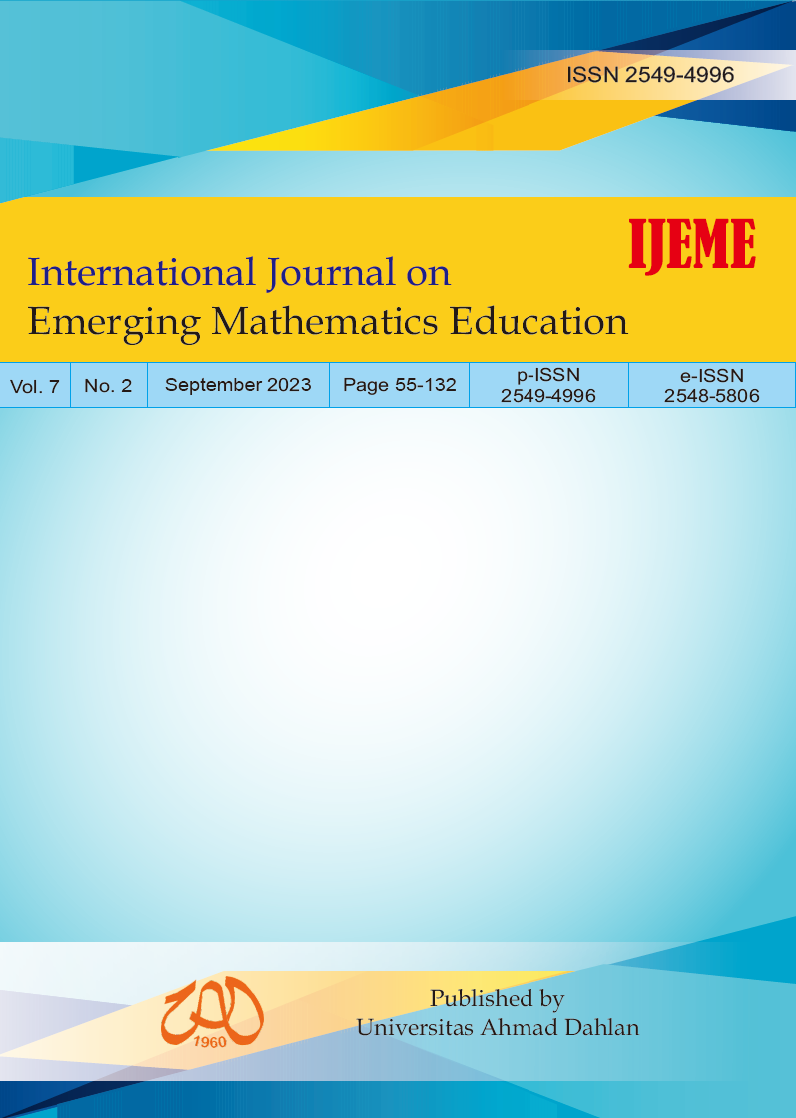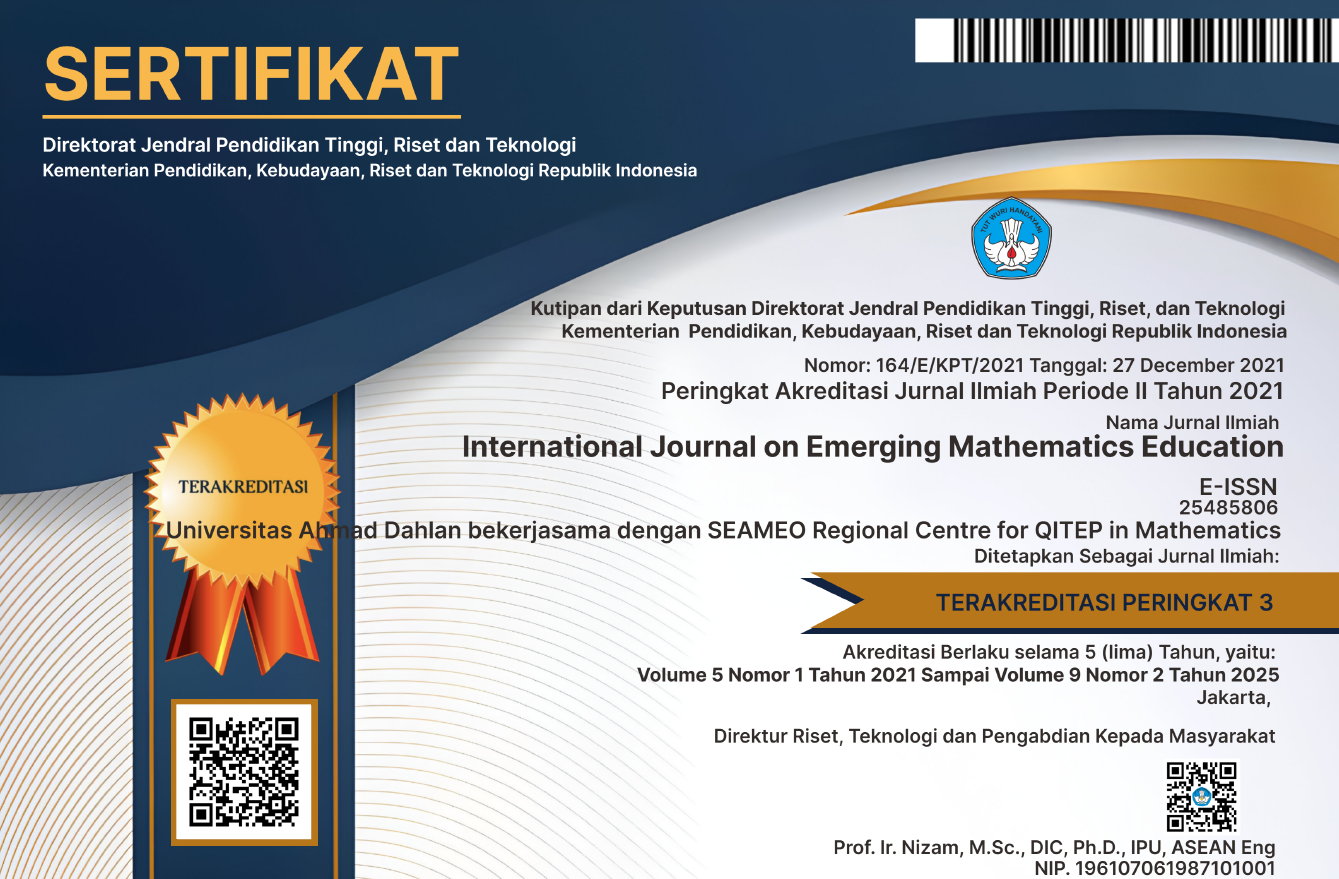Development of PBL-based E-Worksheet for 8th Grade Students’ Critical Thinking Skills
DOI:
https://doi.org/10.12928/ijeme.v7i2.29583Keywords:
problem-solving, problem-based learning approach, number patternsAbstract
This research developed e-worksheet based on Problem Based Learning (PBL) to improve the problem-solving abilities of grade VIII students. The development method uses the ADDIE model, with validation instruments, student responses, as well as pretest and posttest. The validation results show a high level of validity of the e-worksheet. Student responses to E-worksheet are also positive. Pretest and posttest analysis showed a significant increase in problem solving abilities. However, this increase is still limited due to time constraints.References
Agitsna, L.D., Wahyuni, R., & Friansah, D. (2019). Developing student worksheets based on Problem Based Learning on flat-sided geometric shapes. Axiom, 8(3), 429-437.
Borg, W. R., & Gall, M. D. (2003). Educational Research: An Introduction Seventh Edition. Boston: Allyn and Bacon.
Branch, R. M. (2009). Instructional Design: The ADDIE Approach. New York: Springer.
Halim, S.T., Tahir, S.R., Syahri, A.A., & Husrina. (2021). Analysis of Student Errors in Solving HOTS-Based Mathematics Problems on Number Patterns Based on Hadar Criteria. Journal of Mandalika Mathematics and Education, 3(2), 76-94
Khulsum, U., Hudiyono, Y., & Sulistyowati. (2018). Development of teaching materials for writing short stories using storyboard media for Class X SMA students. Diglossia, 1(1), 1-12.
Larson, R., & Farber, B. (2012). Elementary Statistics: Picturing the world. Boston: Pearson Education.
Mardhiyah, R.H., Aldriani, S.N., Chitta, F., & Zulfikar, M.R. (2021). The Importance of Learning Skills in the 21st Century as a Demand for Human Resource Development. Lectura Educational Journal, 12(1), 29-40.
Downloads
Published
How to Cite
Issue
Section
License
License and Copyright Agreement
In submitting the manuscript to the journal, the authors certify that:
- They are authorized by their co-authors to enter into these arrangements.
- The work described has not been formally published before, except in the form of an abstract or as part of a published lecture, review, thesis, or overlay journal. Please also carefully read the International Journal on Emerging Mathematics Education (IJEME) Author Guidelines at http://journal.uad.ac.id/index.php/IJEME/about/submissions#authorGuidelines
- That it is not under consideration for publication elsewhere,
- That its publication has been approved by all the author(s) and by the responsible authorities, tacitly or explicitly, of the institutes where the work has been carried out.
- They secure the right to reproduce any material that has already been published or copyrighted elsewhere.
- They agree to the following license and copyright agreement.
Copyright
Authors who publish with the International Journal on Emerging Mathematics Education (IJEME) agree to the following terms:
- Authors retain copyright and grant the journal the right of first publication with the work simultaneously licensed under a Creative Commons Attribution License (CC BY-SA 4.0) that allows others to share the work with an acknowledgment of the work's authorship and initial publication in this journal.
- Authors are able to enter into separate, additional contractual arrangements for the non-exclusive distribution of the journal's published version of the work (e.g., post it to an institutional repository or publish it in a book), with an acknowledgment of its initial publication in this journal.
- Authors are permitted and encouraged to post their work online (e.g., in institutional repositories or on their website) prior to and during the submission process, as it can lead to productive exchanges, as well as earlier and greater citation of published work.
![]()
Ciptaan disebarluaskan di bawah Lisensi Creative Commons Atribusi-BerbagiSerupa 4.0 Internasional.





